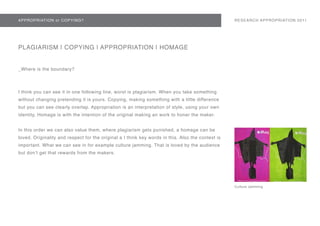Research Appropriation
- 1. APPROPRIATION or COPYING? RESEARCH APPROPRIATION 2011 PLAGIARISM | COPYING | APPROPRIATION | HOMAGE _Where is the boundary? I think you can see it in one following line, worst is plagiarism. When you take something without changing pretending it is yours. Copying, making something with a little difference but you can see clearly overlap. Appropriation is an interpretation of style, using your own identity, Homage is with the intention of the original making an work to honer the maker. In this order we can also value them, where plagiarism gets punished, a homage can be loved. Originality and respect for the original a I think key words in this. Also the context is important. What we can see in for example culture jamming. That is loved by the audience but donât get that rewards from the makers. Culture Jamming
- 2. EXAMPLE APPROPRIATION RESEARCH APPROPRIATION 2011 Tony Cragg Luba Lukovaâs Wolff Olins/Miles Newlyn Grey Moon, 1985 Peace poster, 2001 Unilever, 2004
- 3. EXAMPLE COPYING RESEARCH APPROPRIATION 2011 Luba Lukovaâs Roberto de Vicq de Cumptich www.graceandgo.com Roberto de Vicq de Cumptich Peace poster, 2001 2007 2009
- 4. EXAMPLE COPYING RESEARCH APPROPRIATION 2011 2004 Noord-Amsterdam Nijmegen 2006 2008
- 5. EXAMPLE PLAGIARISM Copy of Unilever logo
- 6. DEVELOPMENT OF A STYLE? RESEARCH APPROPRIATION 2011
- 7. MORE INFORMATION ABOUT APPROPRIATION ART RESEARCH APPROPRIATION 2011 http://en.wikipedia.org/wiki/Appropriation http://www.appropriationart.ca/ http://www.tate.org.uk/collections/glossary/definition.jsp?entryId=23 http://arthistory.about.com/od/glossary_a/a/a_appropriation.htm Karen Borgers Design Academy EIndhoven www.karenborgers.nl







